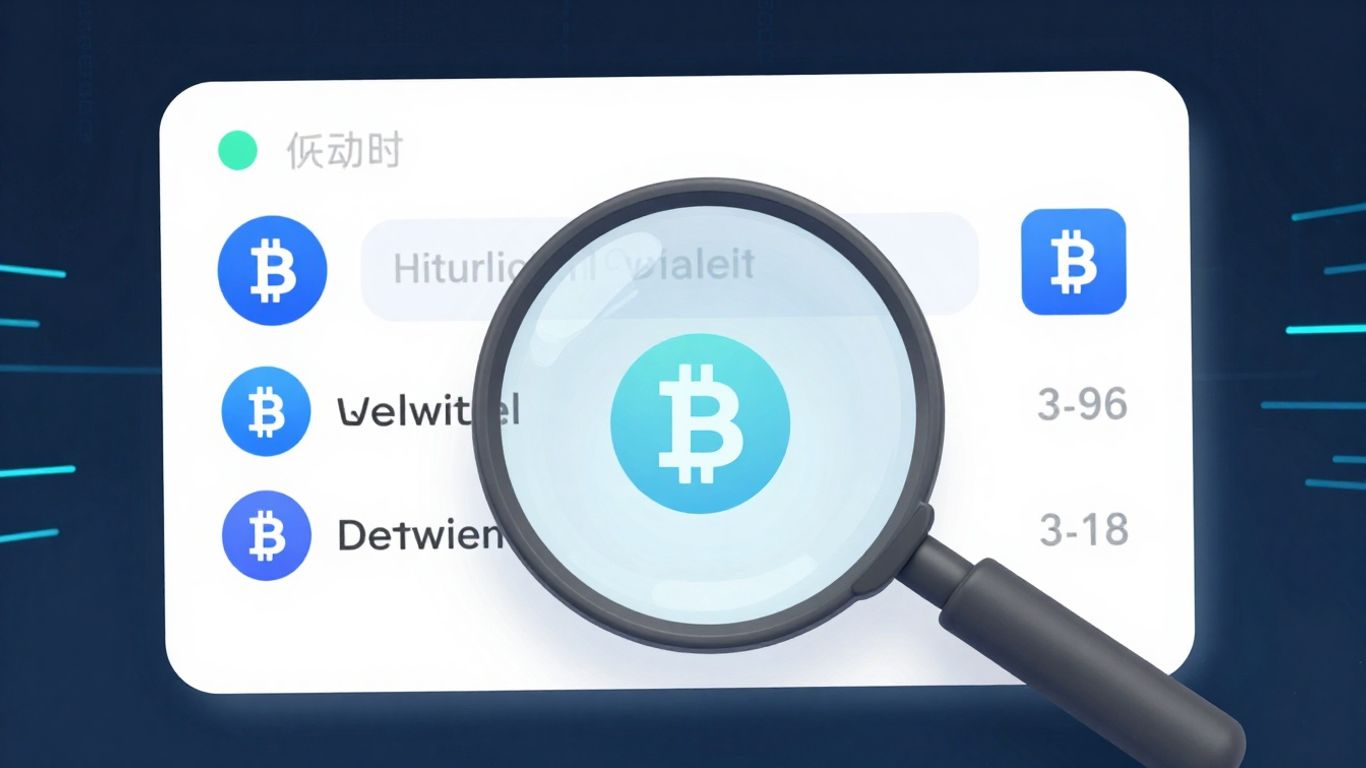[ newsletter ]
Stay ahead of Web3 threats—subscribe to our newsletter for the latest in blockchain security insights and updates.
Thank you! Your submission has been received!
Oops! Something went wrong. Please try again.
Discover Reddit's top picks for the best crypto wallet in 2025. Find secure and user-friendly options for managing your digital assets.





Alright, so you're trying to figure out the best crypto wallet for 2025, and you've heard that Reddit has some opinions. It can be a bit much trying to sort through all the noise, right? People on Reddit talk about everything from security and ease of use to specific coins they're holding. We've sifted through a lot of those discussions to give you a clearer picture of what the community is saying about the top contenders. Whether you're just starting out or you're a seasoned trader, finding the right wallet is a big deal for keeping your digital money safe. Let's see what the Reddit hive mind has picked as the best crypto wallet Reddit 2025.

Exodus is a solid choice if you're looking for a wallet that balances ease of use with a good range of features. It's designed to be pretty straightforward, even if you're not super tech-savvy. This wallet supports a wide variety of digital assets, covering over 50 different blockchain networks, which is great if you hold more than just Bitcoin or Ethereum. Plus, it has a built-in feature to swap your cryptocurrencies right within the app, making it convenient to manage your portfolio.
One of the standout points for Exodus is its integration with Trezor hardware wallets. This means you can use Exodus as a user-friendly interface while keeping your assets more secure on a hardware device. It's a nice middle ground for many users.
Here's a quick look at some of its strengths:
While it's a strong contender, it's worth noting that Exodus doesn't give you direct control over transaction fees, and it hasn't undergone third-party audits, which some users might prefer. Still, for many, the convenience and broad support make it a top pick. You can find out more about getting started with Exodus.
The wallet's design makes it accessible for newcomers, but it also has enough depth for those who have been in the crypto space for a while. It's a good all-around option for managing different types of digital assets.
MetaMask has really become the go-to for anyone diving into Web3, and it’s easy to see why. It connects with pretty much every decentralized app (dApp) and NFT marketplace out there. It’s not just about access, though; it’s got some solid security features, scoring really well on assessments. Plus, you can tweak your transactions, keep an eye on your tokens, and manage slippage, which is handy whether you’re just starting or you’ve been around the block a few times.
It works across a bunch of platforms, including Android, iOS, Chrome, Firefox, and Brave.
While MetaMask is fantastic for interacting with the Ethereum ecosystem and many other EVM-compatible chains, it's worth noting that it doesn't natively support certain popular blockchains like Bitcoin or Solana. Setting up networks for less common chains can also be a bit technical for absolute beginners.
MetaMask is a browser extension and mobile app that lets you manage your crypto and interact with decentralized applications. It’s a popular choice for many because it’s free and relatively easy to use, especially for those focused on Ethereum and related tokens.
Trust Wallet is a solid choice if you're looking for a mobile-first crypto experience. It’s pretty straightforward to get started with, which is nice because nobody wants to spend hours figuring out how to set up their digital money. You just download the app on your phone, and you're pretty much good to go. It supports a huge number of different coins and tokens, way more than some other wallets out there, and it even lets you look at your NFTs right in the app, which is a cool bonus if you’re into that.
One of the best things about Trust Wallet is how easy it is to swap one crypto for another without even leaving the app. It makes managing your different assets much simpler. Plus, it’s got a good security rating, which is always important when you’re dealing with your crypto.
However, it’s not perfect. You don’t get a lot of control over the transaction fees, which can be a bit annoying if you need to speed things up or save money. Also, if you run into a problem, don’t expect to call up customer support; they don’t really offer live help.
Trust Wallet is a great all-around option for people who primarily use their phones for crypto. It handles a lot of different digital assets and makes basic tasks like swapping tokens really simple.
Here’s a quick look at what it offers:
Okay, so let's talk about the Ledger Nano S. This is a hardware wallet, which basically means it's a physical device that keeps your crypto keys offline. Think of it like a super secure USB drive, but just for your digital money. It's a really popular choice, especially if you're starting to hold a bit more crypto and want that extra layer of safety.
The main idea behind hardware wallets like the Nano S is to keep your private keys – the secret codes that give you access to your crypto – completely disconnected from the internet. This makes it incredibly difficult for hackers to get to them. You connect it to your computer or phone when you need to make a transaction, approve it on the device itself, and then disconnect it again. Pretty neat, right?
Here’s a quick rundown of what makes it stand out:
It’s not the flashiest device out there, and the screen is pretty basic, but that’s kind of the point. Simplicity often means better security. You’ll need to use the Ledger Live app to manage your assets, which is where you can see your balances and send/receive coins. It’s a solid, no-nonsense option for anyone serious about keeping their crypto safe.
Trezor is a name that comes up a lot when people talk about keeping their crypto safe. They've been around for a while, and their devices are known for being pretty solid. Think of them as the reliable workhorse of hardware wallets.
One of the big draws for Trezor is its commitment to open-source software. This means that security experts can look at the code, which helps catch any potential issues. It's a nice bit of transparency that builds trust. Plus, they support a huge number of different coins and tokens, over 9,000 according to their latest specs, so you're not limited if you have a diverse collection of digital assets. This makes it a good choice if you're into more than just Bitcoin or Ethereum. You can even connect it to popular browser wallets like MetaMask, which is handy if you want to interact with decentralized applications (dApps) while keeping your funds on the hardware device. It’s a good way to get into DeFi trading without putting all your assets at risk.
Here’s a quick look at what makes Trezor stand out:
While Trezor devices are generally straightforward, like any hardware wallet, there's a learning curve. Getting your recovery phrase written down correctly and stored safely is super important. Mess that up, and you could lose everything. It’s a small step, but it’s the most critical one.
They offer a few different models, but the Trezor Safe 5 is a good example of their approach. It has a nice color touchscreen and uses a secure chip to protect your private keys. It also has features like passphrase protection and supports Shamir Backup, which gives you different ways to recover your wallet if something happens to the device itself. For anyone looking for a secure, well-established hardware wallet that balances ease of use with strong security, Trezor is definitely worth considering.

Coinbase Wallet is a solid choice, especially if you're already familiar with the Coinbase exchange. It's a non-custodial wallet, meaning you hold your own private keys, which is a big plus for security. It supports a lot of different crypto coins and tokens, plus NFTs and decentralized apps (dApps). They've also put in some good security features like transaction previews and biometric logins, which is nice for everyday use.
One thing that stands out is their "Quests" feature. It's basically a way to learn about crypto and earn a bit of it as you go. It’s a pretty neat way to get more comfortable with different aspects of the crypto world without risking your own funds.
However, it's not perfect. Compared to some other non-custodial wallets, it doesn't offer as many advanced customization options for things like transaction fees. Also, because it's so closely linked to the main Coinbase platform, some people who are really focused on complete decentralization might feel a bit hesitant. It's a good balance for many, but maybe not for the absolute purists.
Coinbase Wallet is backed by a well-known name in the crypto space, offering a user-friendly experience with a good range of features for both beginners and intermediate users.
Here's a quick look at some of its features:
While it's a strong contender, especially for those who value ease of use and brand recognition, it might lack the deep customization and open-source transparency that some advanced users seek in a purely non-custodial solution.
BlueWallet is a solid choice if you're primarily looking for a mobile Bitcoin wallet with some advanced features. It's got a pretty clean look and feel, making it easy to get around even if you're not a crypto expert. What really sets it apart is its support for different wallet types, including Lightning Network wallets, which is great for faster and cheaper transactions. Plus, it offers multi-signature and watch-only options, giving you more control over your funds.
One of the standout features is the push notification service. You get alerts right on your phone for wallet activity, so you don't have to constantly check your balance. It also handles various transaction types, like batching and partially signed transactions, which can be handy for more involved users.
However, it's not perfect. If you're looking for a ton of educational material to learn the ropes, BlueWallet might fall a bit short. Some of its more technical features, while powerful, could also be a bit much for absolute beginners.
Here's a quick look at what it offers:
While BlueWallet might not hold your hand with extensive tutorials, its focus on mobile Bitcoin management and features like Lightning support make it a strong contender for users who want more control and efficiency on the go.
Tangem wallets are pretty interesting because they ditch the usual seed phrase thing. Instead, you get these credit card-like chips that use NFC to talk to your phone. It's a different approach, for sure. The secure chip inside has a pretty high certification, EAL6+, which is what they use for passports, so that sounds pretty solid. They also had their firmware checked out by a couple of security companies, which is good to see.
What makes Tangem stand out is its simplicity. You just tap the card to your phone, and it connects. No cables, no charging needed for the card itself. It's designed to be super straightforward.
It's a neat option if you're looking for something that moves away from traditional hardware wallet setups.
The whole idea is to make managing crypto less of a hassle, especially when it comes to keeping your private keys secure. By putting them on a chip and using your phone to interact, they're trying to cut down on the common ways people lose their crypto, like forgetting or losing a seed phrase.
Right now, Tangem supports a good number of crypto assets, though it might not be as many as some of the older, more established hardware wallets out there. Still, for many people, the selection is more than enough. It's a solid choice if you value ease of use and a modern security design.
Sparrow is a desktop wallet that really focuses on Bitcoin. If you're someone who likes to have a lot of control over your Bitcoin transactions and how they're handled, this might be up your alley. It’s a lightweight option, meaning it won’t hog your computer’s resources, and it works on Windows, Mac, and Linux.
What sets Sparrow apart is its flexibility in connecting to servers. You can choose to connect to public servers, private ones, or even run your own Bitcoin Core node for maximum privacy. This level of choice is pretty rare and appeals to users who are serious about their Bitcoin security and privacy. Plus, it has a transaction editor that’s quite handy; think of it like a built-in tool that lets you see and tweak transaction details before they hit the blockchain. It also plays nice with hardware wallets like Ledger and Trezor, which is a big plus for security.
However, Sparrow isn't really for someone just starting out with crypto. You really need to understand the basics of Bitcoin to get the most out of it. It doesn't have built-in features for swapping different cryptocurrencies or buying crypto with regular money, so you'll need other services for that.
Sparrow is a solid choice for Bitcoin enthusiasts who value control and privacy, but it comes with a steeper learning curve than many other wallets.
Here’s a quick look at what Sparrow offers:
Zengo is a pretty interesting choice if you're tired of dealing with those complicated seed phrases. Seriously, who hasn't worried about losing that list of words? Zengo ditches that whole system, using something called MPC, or Multi-Party Computation, instead. It basically means your crypto is secured using advanced math and your phone's own security features, like your fingerprint or face scan. This keyless approach makes it super accessible, especially if you're new to crypto or just want a simpler way to manage your assets.
It's a mobile-first wallet, so it's really designed for people who want to trade on the go. The app lets you swap tokens easily and connect to different decentralized applications (dApps) without leaving the wallet. Plus, they offer 24/7 customer support, which is a big plus when you're dealing with money.
Here’s a quick look at what Zengo brings to the table:
While Zengo is great for ease of use and security for everyday trading, some really advanced users might find it lacks the deep customization options found in other wallets. It's a trade-off for that simplicity, but for most people, it's a really solid option.
It’s definitely a wallet worth checking out if you prioritize convenience and a hassle-free experience, especially if you're actively trading or exploring DeFi.
So, we've looked at a bunch of wallets that Reddit users are talking about for 2025. It’s clear that picking the right one really depends on what you're trying to do with your crypto. Whether you're just starting out and want something simple, or you're a serious trader needing all the bells and whistles, there's a wallet out there for you. Remember to think about security, how easy it is to use, and what coins you plan to hold. Don't just pick the first one you see; do a little digging to make sure it fits your needs. Your crypto journey will be a lot smoother if you've got a solid wallet backing you up.
A crypto wallet is like a digital backpack for your digital money, like Bitcoin or Ethereum. It holds your private keys, which are like secret codes that let you access and spend your crypto. You need one to keep your crypto safe and to send or receive it.
A 'hot' wallet is connected to the internet, like an app on your phone or a browser extension. It's easy to use for quick trades. A 'cold' wallet, like a special USB drive (hardware wallet), is kept offline. It's super secure for storing large amounts of crypto long-term.
Yes, hardware wallets are generally considered the safest option. They keep your private keys offline, making them very hard for hackers to steal. Think of them as a super secure vault for your digital money.
For trading, you want a wallet that's fast and easy to use. Good trading wallets often let you swap different cryptos right inside the app, show you market prices, and connect to other trading platforms without extra hassle.
Many wallets support a wide variety of cryptocurrencies. You can often store Bitcoin, Ethereum, and many other digital coins all in the same wallet. Just make sure the wallet you choose supports the coins you want to hold.
A 'non-custodial' wallet means YOU are in charge of your private keys and your crypto. No company can take your funds away. This gives you full control, which is a big deal in the crypto world.


